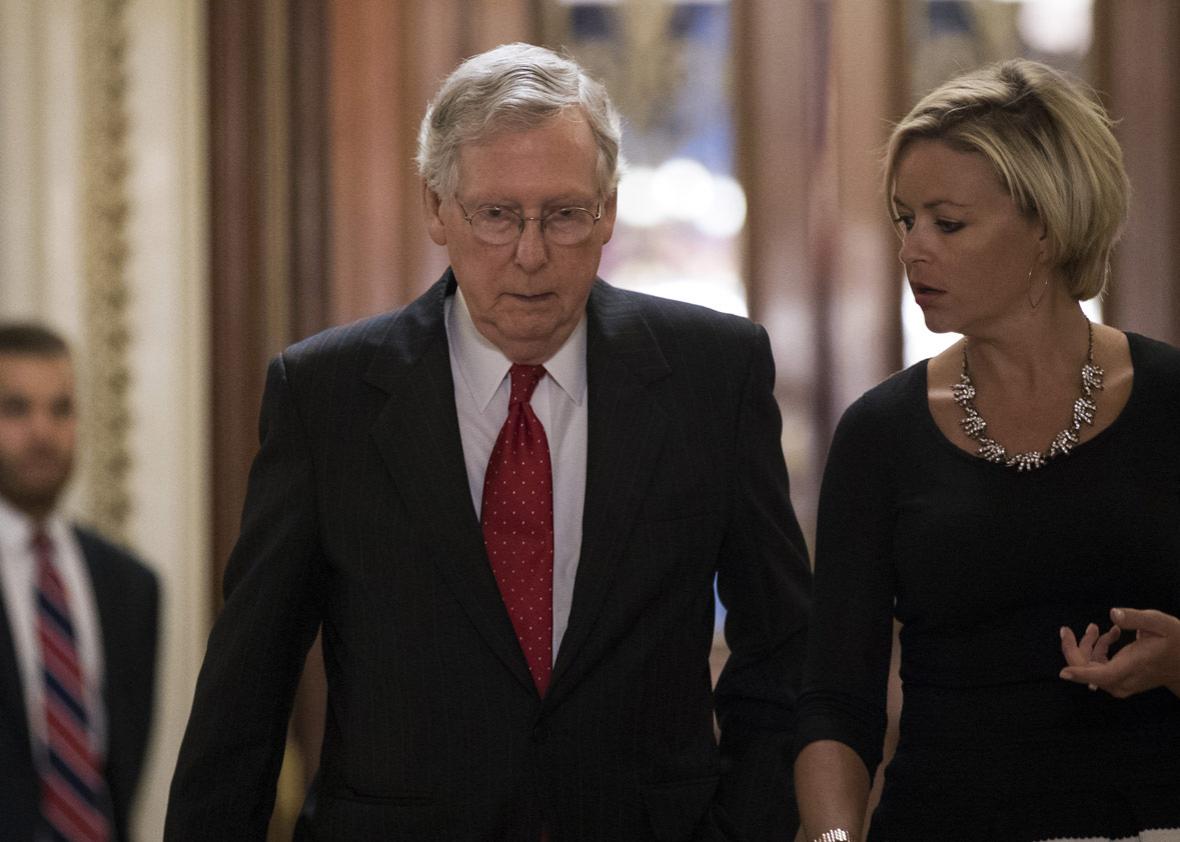“The skinny bill as policy is a disaster,” said Republican Sen. Lindsey Graham at a press conference on Thursday.
It seems like Lindsey Graham does not like the skinny bill. But let’s check in on that press conference again. This crazy news cycle changes second by second!
“The skinny bill as a replacement for Obamacare is a fraud,” Graham continued.
As an experienced political analyst, I can now tell you that Lindsey Graham does not in fact like the so-called skinny repeal of the Affordable Care Act. He also might still vote for it, because something doesn’t have to be digestible for Congress to shove it down our throats.
As my colleague Jim Newell explained, the point of this skinny initiative is to get something, anything passed so the House and Senate can commence a conference in which they dream up a more marketable version of Trumpcare. The skinny repeal itself was supposed to be a mere wisp of a thing, a two-dimensional placeholder until the committee got cracking.
And then, as Newell noted, those old eighth-grade civics lessons kicked in and senators like Graham realized “that a bill they pass could become law”—that is, that the House could affirm the skinny bill, making it the actual, official Republican health care plan. Like most diet regimes, this one was supposed to set the GOP up to gorge itself later. But nobody wants to follow up a two-week juice cleanse with an additional 100-year juice cleanse.
Skinny, with its connotations of the human body, is a strange word to encounter in politics, which (we are led to believe) concerns diaphanous values and is practiced by talking flag pins. Upon taking office, new presidents sometimes draw up “skinny budgets”—that is, undetailed proposals for spending and cuts. Trump’s skinny budget back in March was an emaciated creature, only 53 pages long. (Obama’s was a healthy 134 pages, while George W. Bush’s zaftig blueprint spanned 207.) The Trump document was “skinny” in another sense, too. It suggested slashing government spending on foreign aid and a smorgasbord of domestic programs, and it ripped the safety net for poor and sick Americans to shreds.
Likewise, the Better Care Reconciliation Act proposed deep cuts to Medicaid (about $772 billion) and scythed tax credits by more than $400 billion, according to Health Affairs. It overhauled the ACA’s consumer protections, allowing states to opt out of a rule barring insurers from discriminating against patients with pre-existing conditions. The Congressional Budget Office estimated that the bill’s rollback of Obamacare coverage provisions would cost 22 million Americans their health insurance. Rather than use a scalpel to trim the ACA’s fat, the GOP caucus had gathered around the world’s biggest bone saw and got to work chopping through the nation’s limbs and organs.
Recognizing that massive amputations weren’t an easy sell, Republicans moved on to a slimmer proposal. Unlike the fatso repeal promised in the rejected text of the BCRA, the skinny alternative would get rid of individual and employer mandates and a controversial tax on doctors’ equipment. All of the victorious optics, only some of the calories/misery! Mitch McConnell and Paul Ryan were probably cheers-ing each other with Skinnygirl margaritas, at least up until the moment that Graham, John McCain, and Ron Johnson stood up on Thursday evening and said they wouldn’t vote for skin and bones.
Skinny is yet another example of the weird political branding that characterizes the Trump era, the latest “crooked Hillary” or “tired of winning” or “drain the swamp.” We were meant to see an attractive leanness in the Senate’s latest effort; it is neither wasteful nor indulgent, and it subjects the lardiest parts of Obama’s health care program to liposuction. What’s more, for lawmakers on the fence, the bill was supposed to be unthreatening, minimal, insubstantial. If it walked into you by accident, the weight of its body would have a negligible impact. (Good thing, because you’re probably uninsured in this analogy, and hospital visits are expensive!) The skinny proposal merely rolls back measures that most Republicans condemn—it doesn’t touch the sensitive Medicaid issue, and it doesn’t envision a new path forward. It is agreeably un-fleshed out, a positive slogan with absolutely no policy implications. Think “one neat trick to drop five inches from your waistline and 16 million people from their health insurance plans.” Or think “damn, we better come up with another name for this thing, because people are starting to figure out that it is awful.”
In a press conference Thursday, Sarah Huckabee Sanders attempted to rebrand the lithe proto-law as a “freedom bill” because “it removes a lot of those mandates that allow people to have the type of freedom, have states have the freedom that they want.” In classic yo-yo diet form, this new designation evoked fattening, delectable, stars-and-stripes-y freedom fries. Alternately, a McConnell aide told reporters on Wednesday that in place of “skinny repeal,” his boss preferred the term “consensus.” Indeed, after a long, hard day of work, there’s nothing better than kicking back on the couch, firing up the old boob tube, and cracking open a heaping carton of delicious, delicious … consensus.
The Democrats, for their part, fired back against skinny with the bless-their-hearts lameness that characterizes all donkey-adjacent messaging. In a statement released on Tuesday, Nancy Pelosi quipped that the “skinny” GOP plan “would cause big league cost increases and coverage losses.” Good one. Try the veal.
Goofy wordplay aside, this is indeed the central irony of the Republicans’ opposite-day sloganeering: The skinny repeal may sound tenuous and incorporeal, but its consequences for the country would be all too real.
